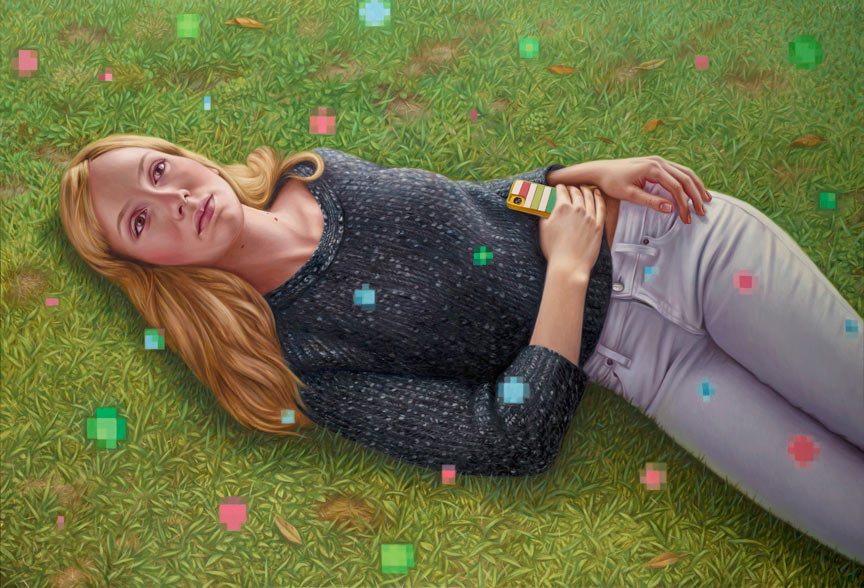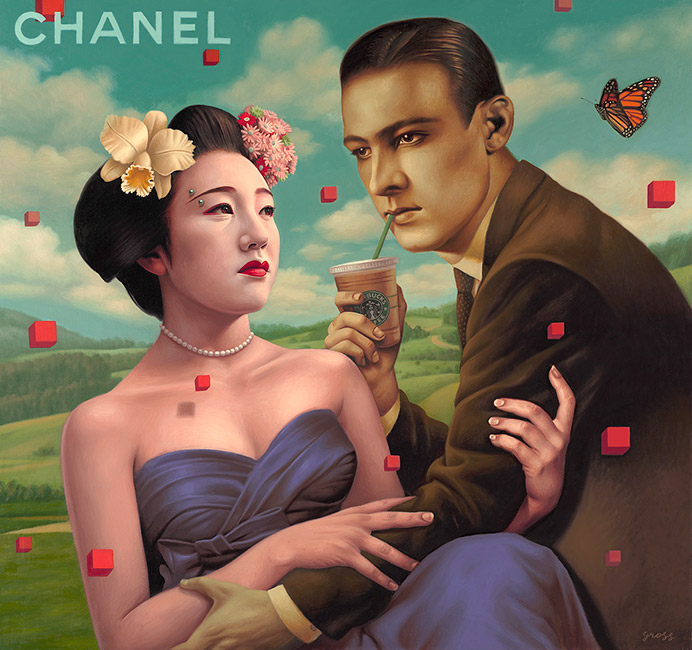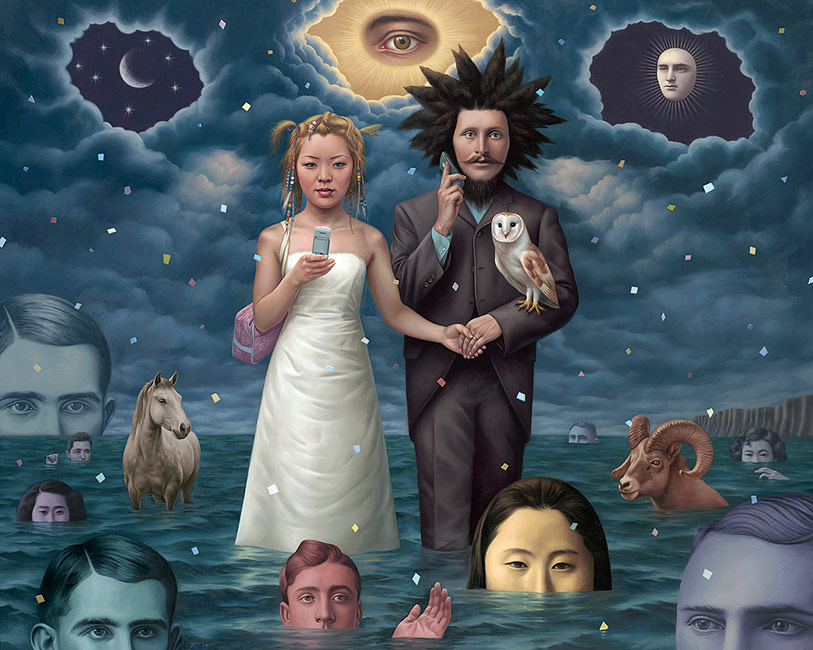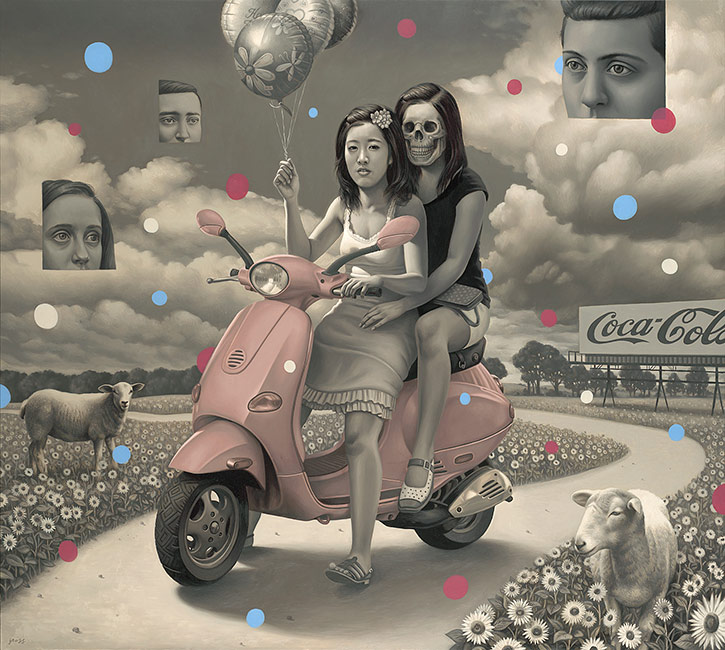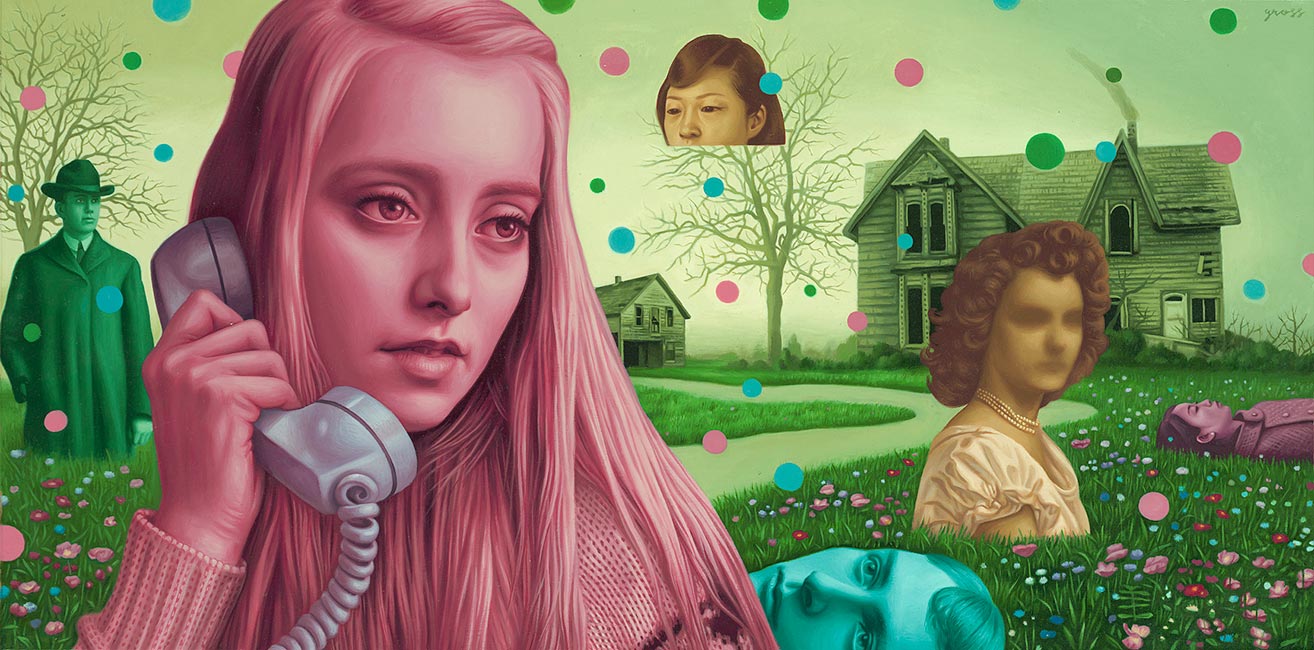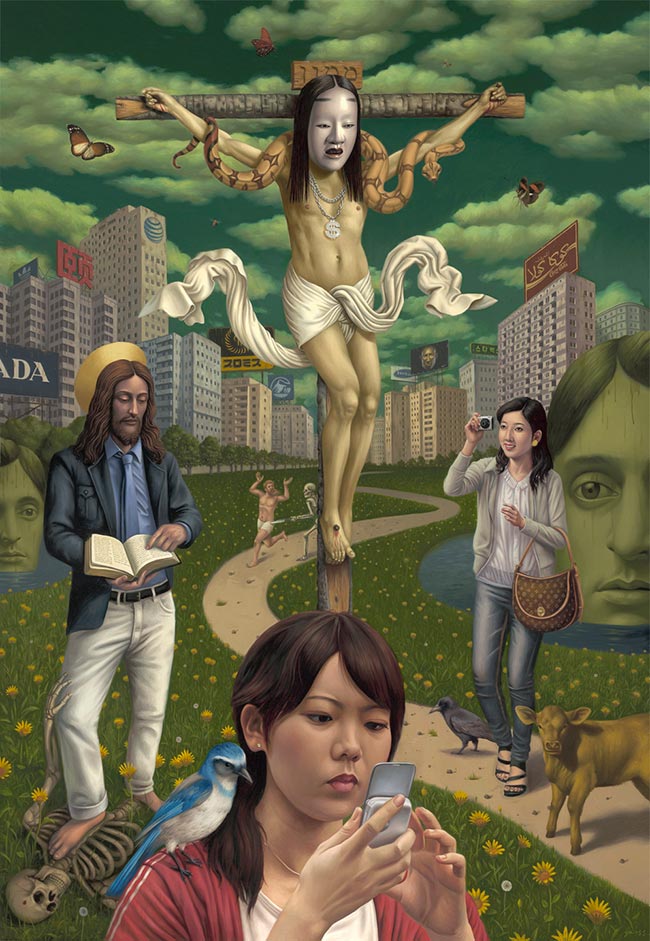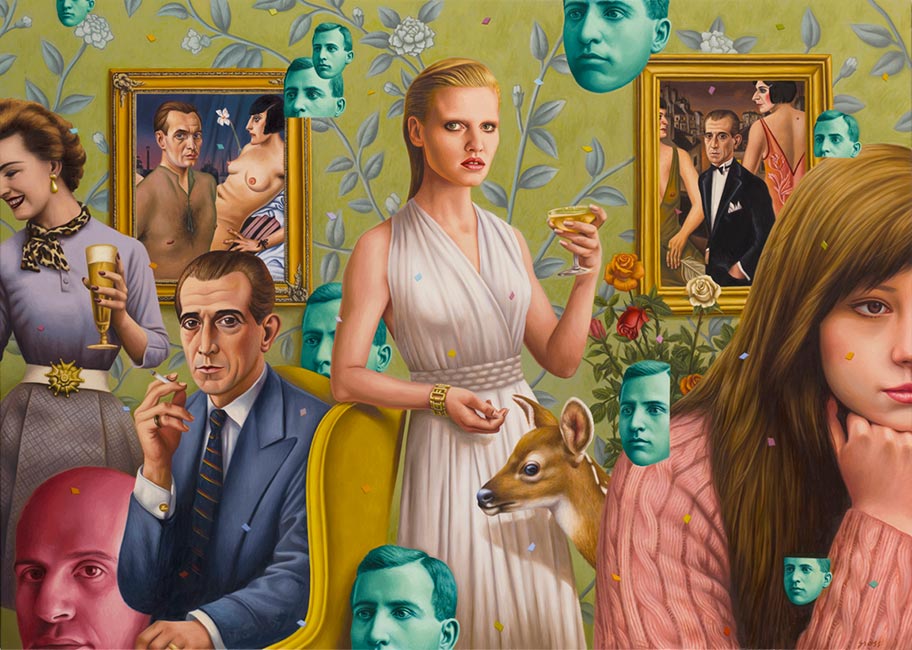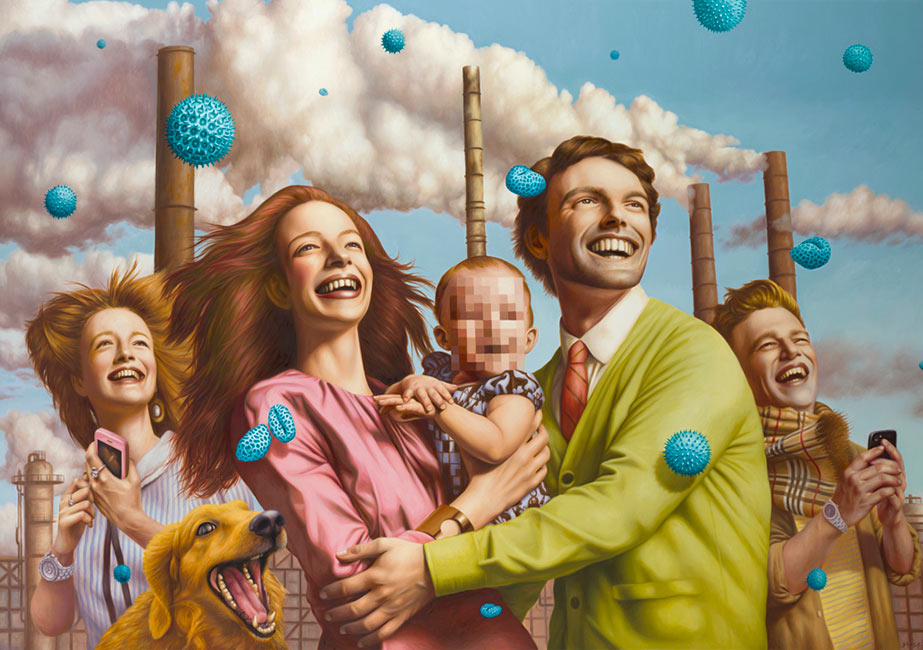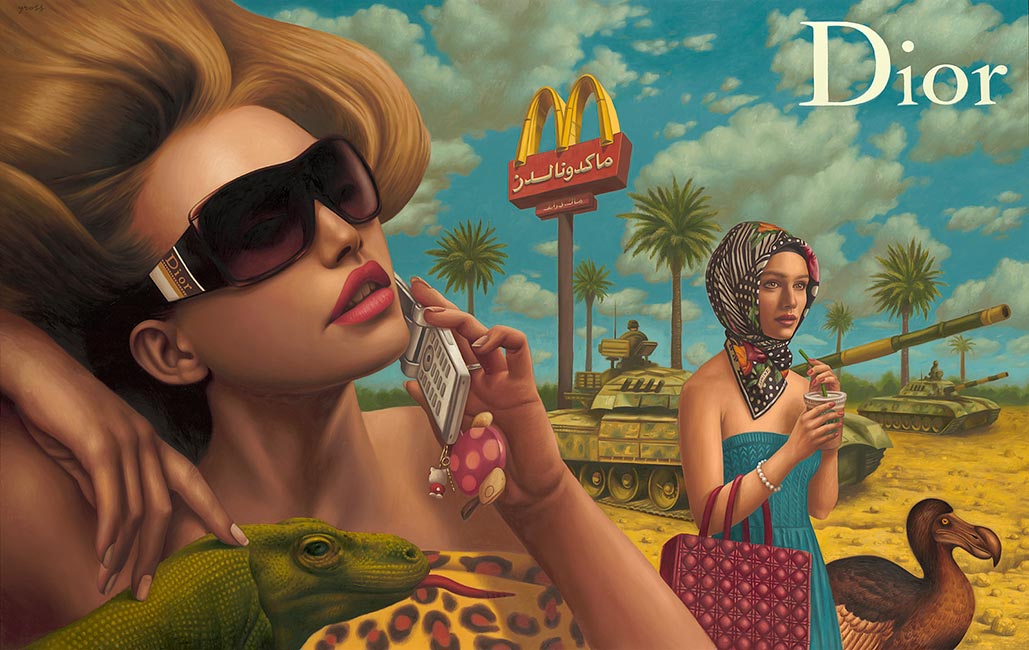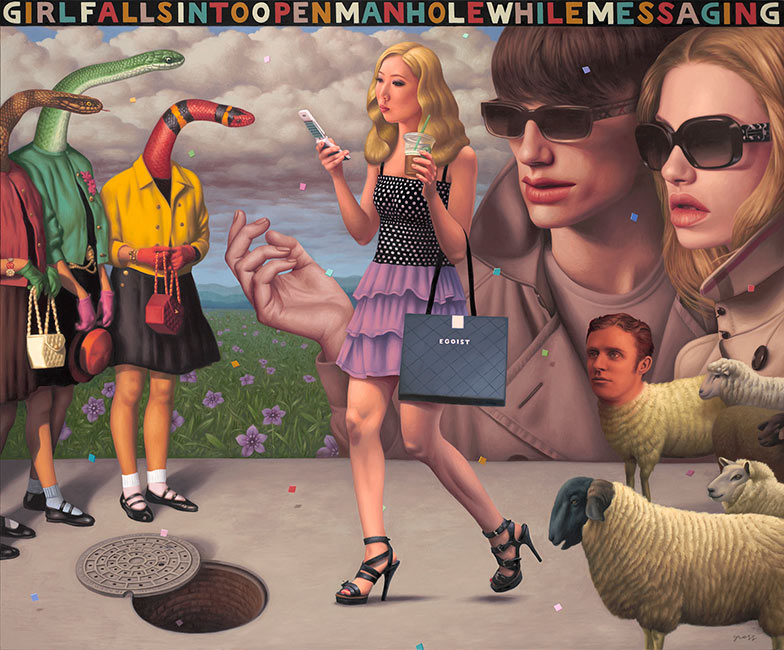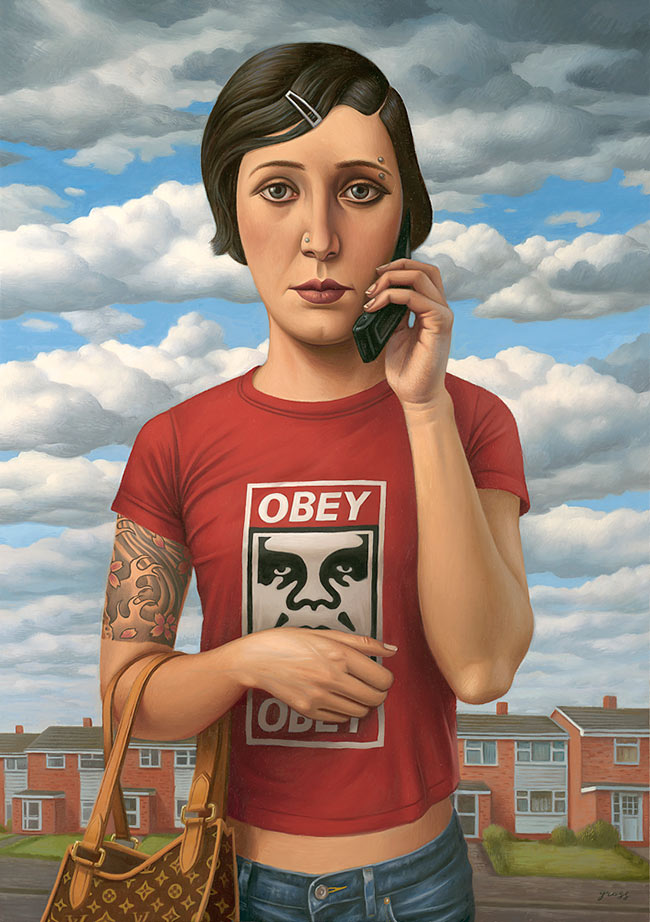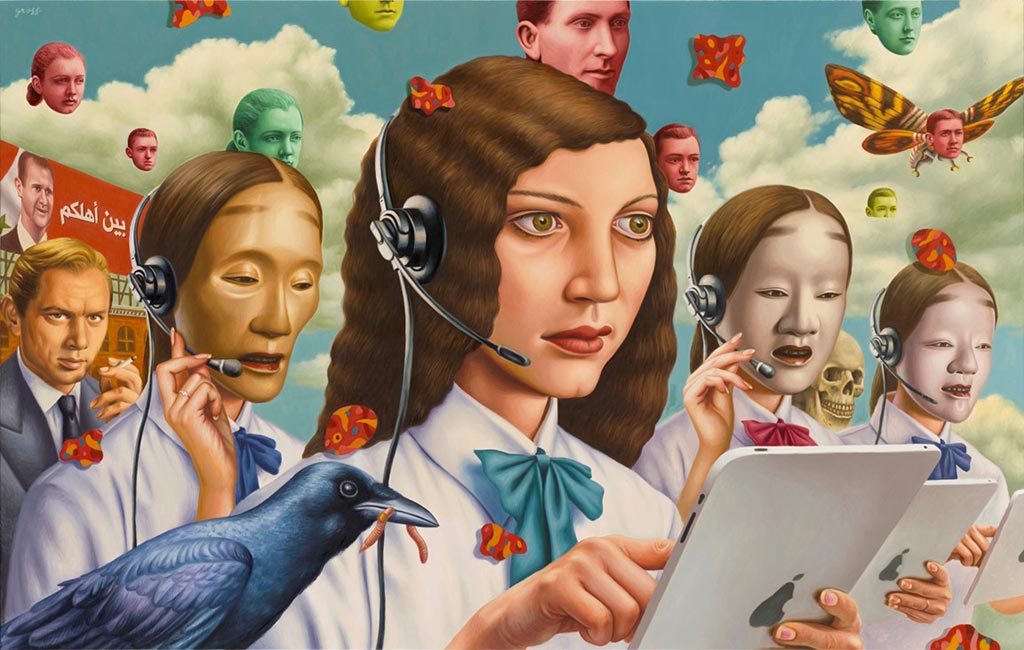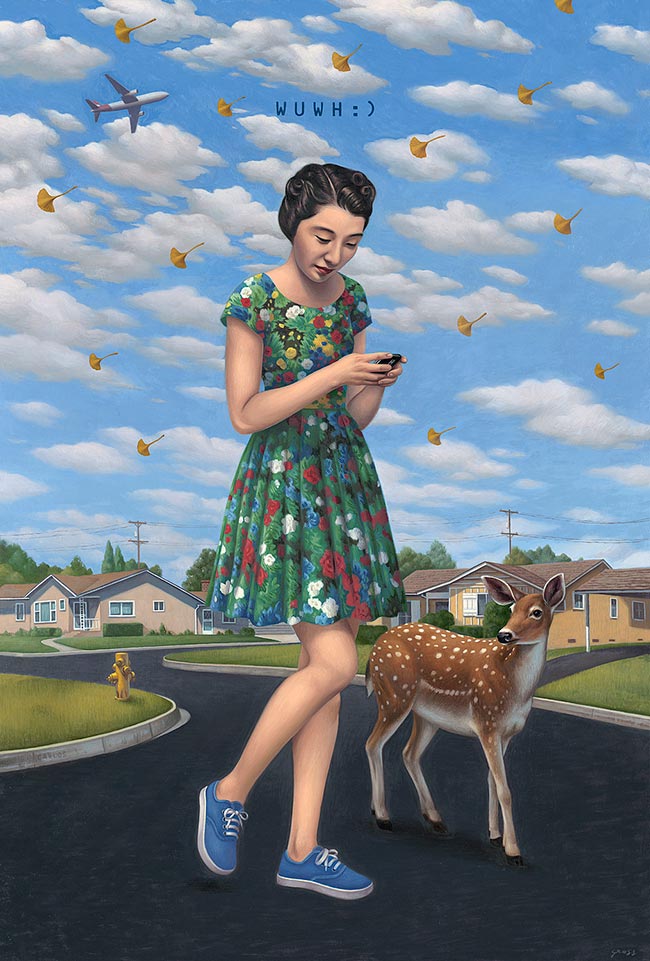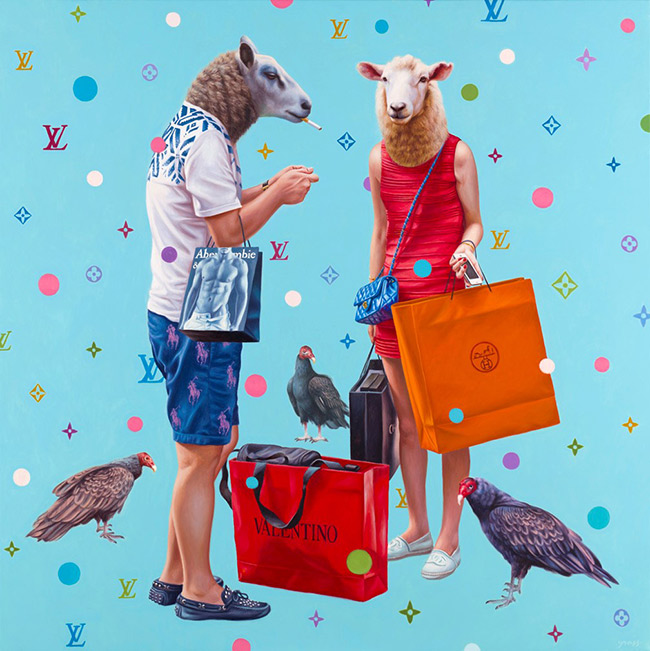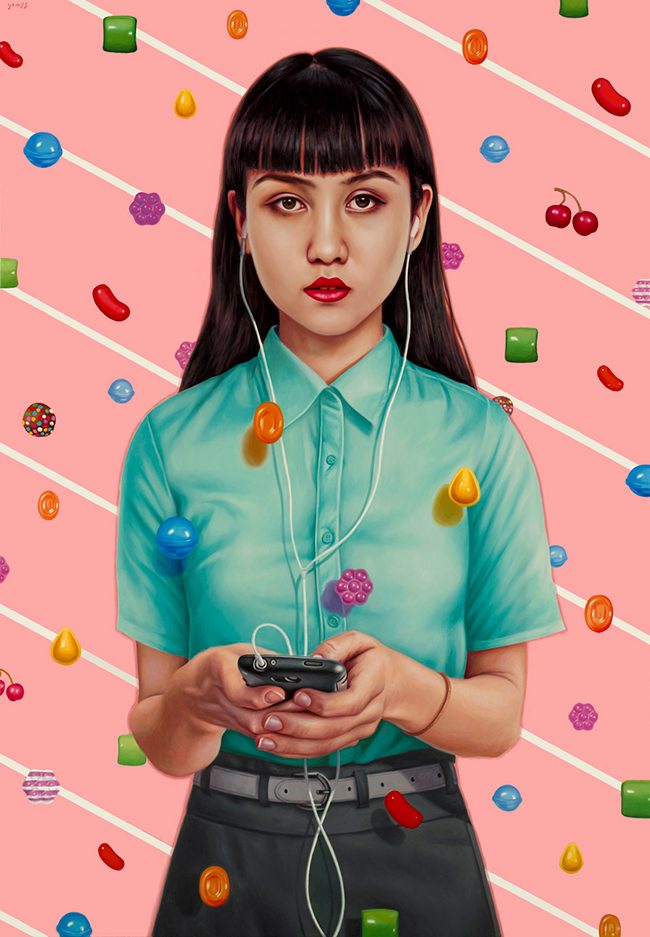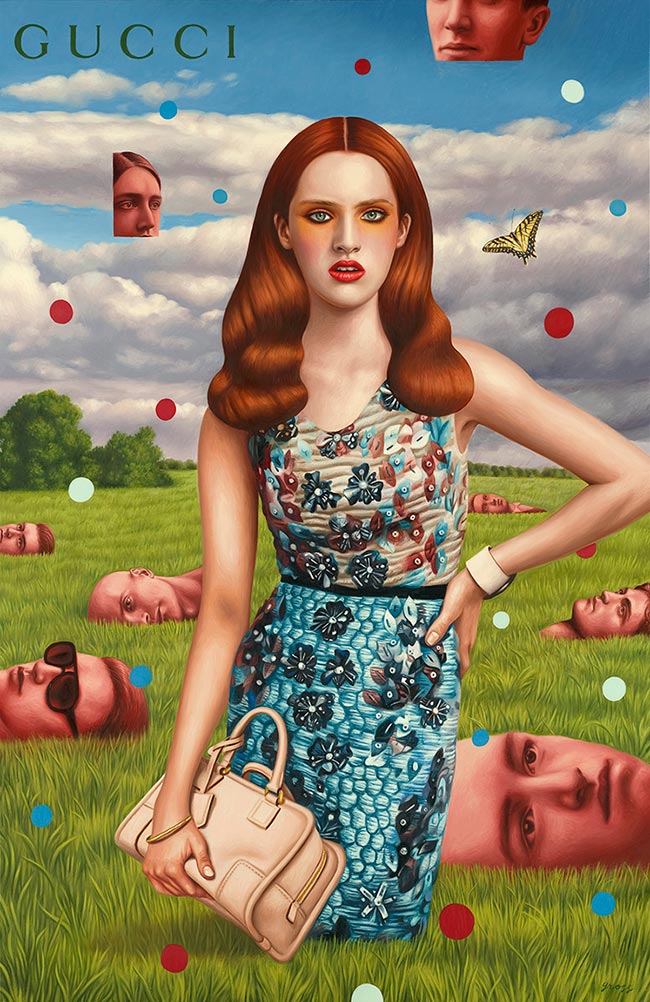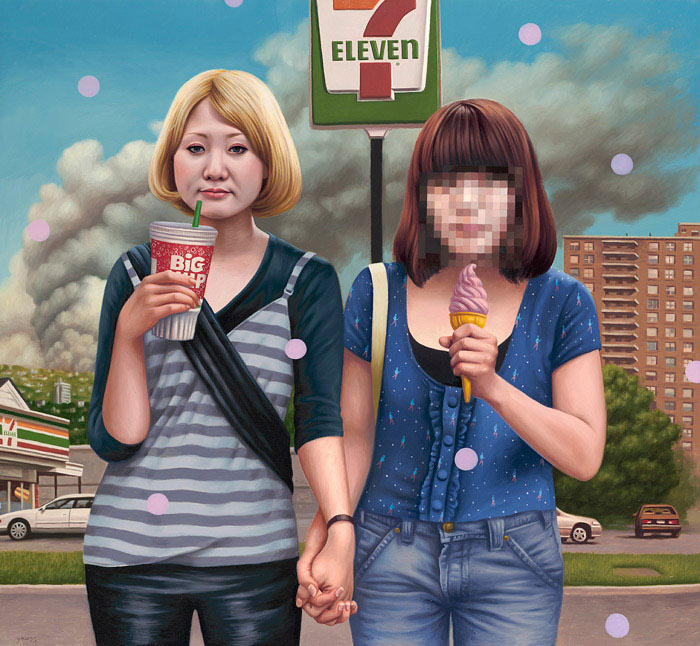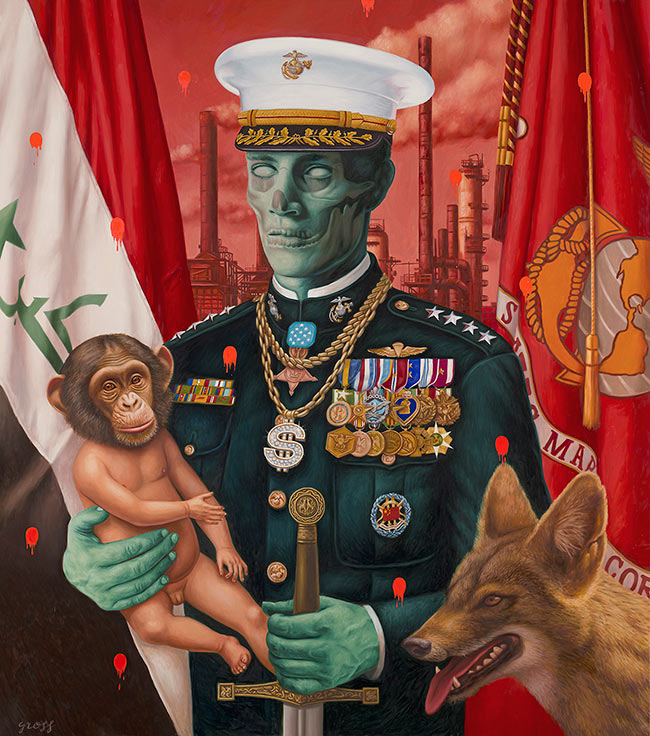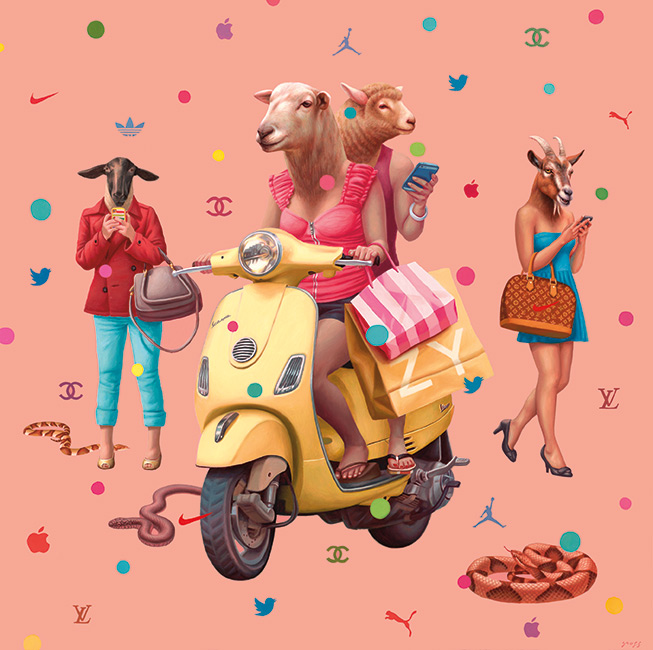Within the emotionally charged and powerfully discerning art of Alex Gross, we are treated to scenes of both dreamlike surreality and slabs of hard hitting reality, which dish up copious disturbing home truths, while asking us to confront our modern day illusions. Gross is a master at cutting straight through the lines of code and the technology they’ve created (all of which our contemporary culture has adopted with such a voracious appetite), to reveal the concerning repercussions of our immersion in a world which fosters alienation, dislocation and distance. The apparent pessimism emanating from Gross’ paintbrush is undoubtedly justified and through his art he provides a meeting point where we can all unplug, reconnect with one another and greet tomorrow with fresh perspectives.
Alex Gross was born in 1968 in Roslyn Heights, NY and currently lives in Los Angeles. In 1990, he received a BFA with honors from Art Center College of Design in Pasadena. Since then, he has become one of the most renowned New Contemporary pop surrealists, has had nine solo exhibitions at various galleries, and participated in dozens of museum and gallery exhibitions across the globe.
WOW x WOW is thrilled to have had the opportunity to pose a few questions to Alex as he was putting the finishing touches to a fresh body of work, entitled, ‘Antisocial Network’. This new collection will be available for viewing at Corey Helford Gallery as of 25th February. Get a little bit of insight into this forth coming exhibition and more, in the following exclusive interview.
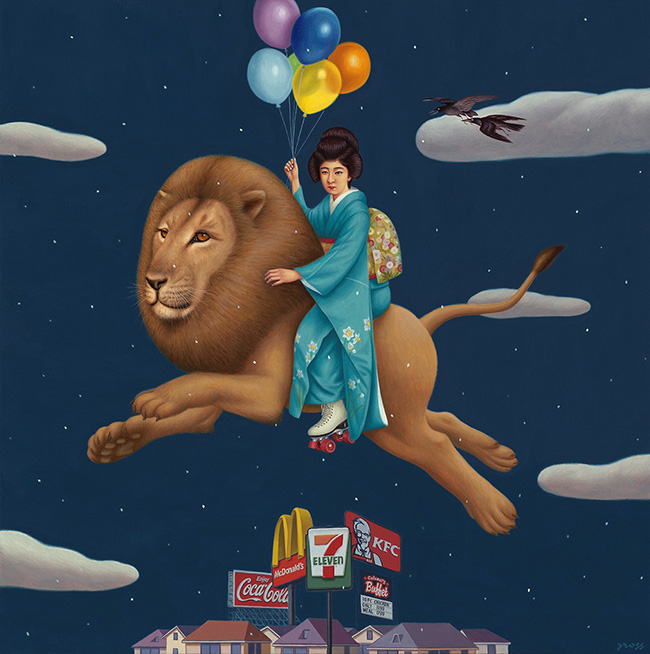
Hi Alex! First of all, thanks for agreeing to free up some of your valuable time in order to have this wee chat, we really appreciate it. Your upcoming show at Corey Helford Gallery is entitled, ‘Antisocial Network’. We’d love to hear you talk your preparation for the exhibition and about the direction in which you’ve been steering the themes of your work this time around.
I’ve been working on this show for two years. The exhibition is a bit of a split personality. Some of the work is about technology and its role in our lives. Other pieces in the show are more based in realism and are more about mood and emotion. As I’ve done more and more work, I’ve definitely moved towards being more realistic in my visual style. Sometimes I do something more surreal, and other times it’s not. So, this show has a range from the real to the surreal. But what I think ties most of the work together is an emotional undercurrent that runs through everything, the idea of disquietude, anxiety, distraction, alienation. I think these things are being felt to different degrees by so many people today in so many places. My work is mostly about that, but hopefully not in a depressing way, but rather in a way that will make people feel a connection with me, and hopefully with other people too.
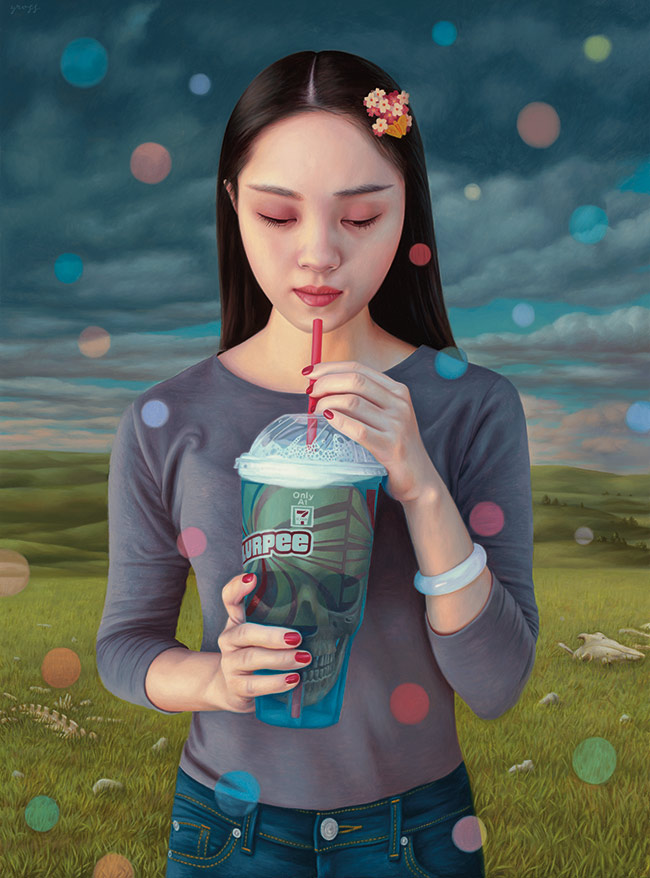
This’ll be your first exhibition on the west coast for over a decade. Was this an intentional move, or is it just the way things developed naturally?
It was not intentional. I just was working with a New York gallery for a while and things went well with them. Since I did not have a relationship with any galleries here, it was easy to keep working with the New York gallery. Eventually, things started to change for them and I thought it was time to try showing here again since it had been so long.
‘Sunday in the Park with Reptilians’ was the one of the first of your new paintings to be revealed online. It’s such a fantastic piece! Was there an incident that sparked your idea for the painting, or did it subconsciously rise to the surface during the act of creation? Please talk to us about this image.
I have a two year old son, and I take him to the park pretty often. When we were there, I was struck by how many people were looking at their phones, and also by how many of them were actually reptilians. Luckily, there were constantly drones buzzing around overhead so I didn’t have to worry too much about the reptilians abducting us for evil experiments or anything like that. And the tulips were lovely. In my version of the scene, I did choose to embellish the fashion choices of the reptilians and the humans alike.
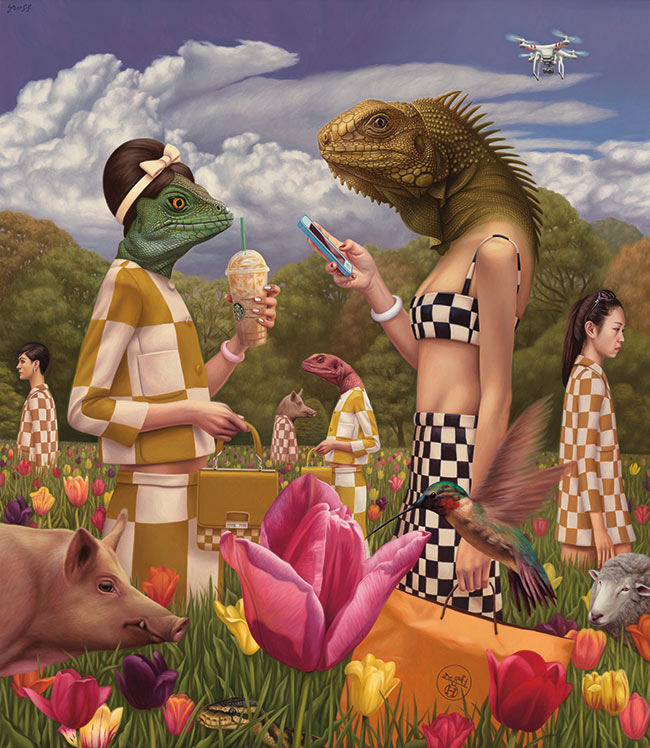
In addition to the larger works you’ve painted for the ‘Antisocial Network’, you’ve also created a range of new cabinet card paintings. How do these fit into the overall concept of the show and what was it that initially inspired you to develop this intriguing addition to your creative output?
The cabinet cards have no relationship to my larger paintings or to a specific show. They are simply based on pop culture characters from movies, TV, comics and popular culture. So, I have tried to do some currently relevant characters for this show. I’ve done a David Bowie card, and a Netflix Daredevil card, among others.
Given your lack of optimism about America’s future, which you have expressed both verbally and through your artwork, it would be very interesting to hear your current thoughts about that. Particularly in light of the election of Trump and all the changes the country is currently undergoing along with the unrest that has understandably risen.
My pessimism about the future is not just limited to America, unfortunately. I have a dim view of human nature and am skeptical that we can overcome things like greed. What has happened here in the states with the election of a narcissistic, reality show starring buffoon, has been a massive shock to myself, my family, and the vast majority of my friends and social media peeps. I don’t think too many of us took Trump that seriously until election night when we saw him starting to win.
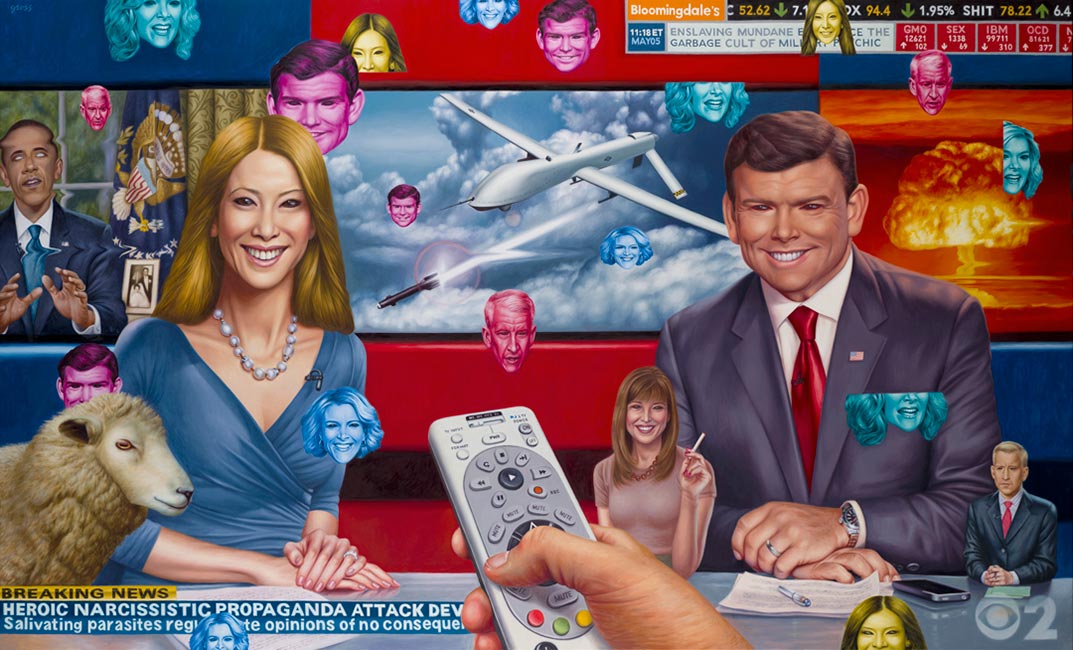
I suppose many of us that loathe trump and everything he stands for take some solace in the idea that, if we survive this terrible administration, hopefully the next one will swing back to something more liberal and less in favor of giant corporations. However, ultimately the system here in America and in most first world countries is, at its core, deeply corrupt. In America, all the big corporations pay millions of dollars to support candidates from both parties. Then, whoever wins is beholden to their large donors. Congress is ceaselessly swarming with lobbyists from these conglomerates. They even write some of the bills that become laws. That’s why we rarely see significant change. The only way to change things would be to take money out of politics. But, since the politicians themselves would have to approve such a thing, it seems highly unlikely to ever change.
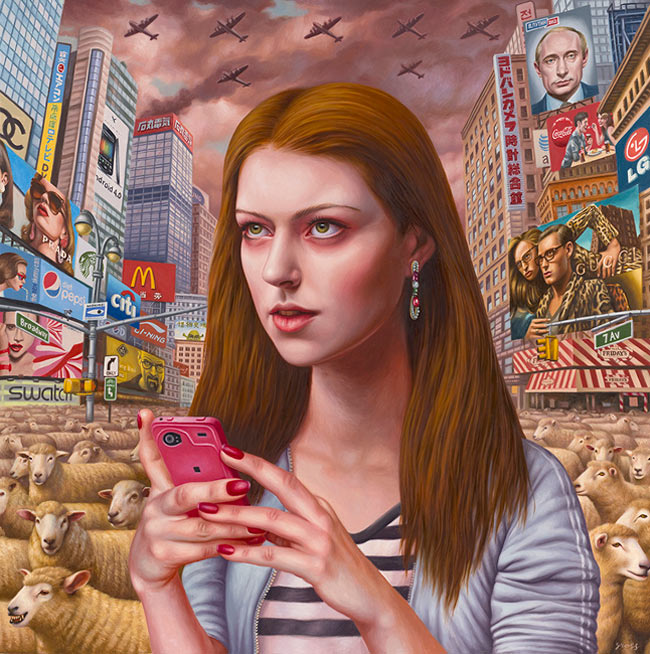
Do you find that creating the type of art you make helps you work through the more pessimistic thoughts you have about our world? Do you have hopes for what your audience or collectors are rewarded by through spending time with your imagery? If so, we love to hear about them and also to what extent you consider the viewer while constructing your art?
Yes, making my ‘art’ is definitely a very important outlet for some of my views of the world around me. All great forms of art, like film, literature, even comedy, are great when they make a personal connection with people. So, although I am certainly not claiming to be great, I do hope that some people will feel this kind of connection with some of my work. Of course, not everyone will like it or be moved by it. But that’s alright. As long as I have some kind of audience that relates to what I am saying, then I feel just a little less powerless, and that perhaps my existence has some purpose.
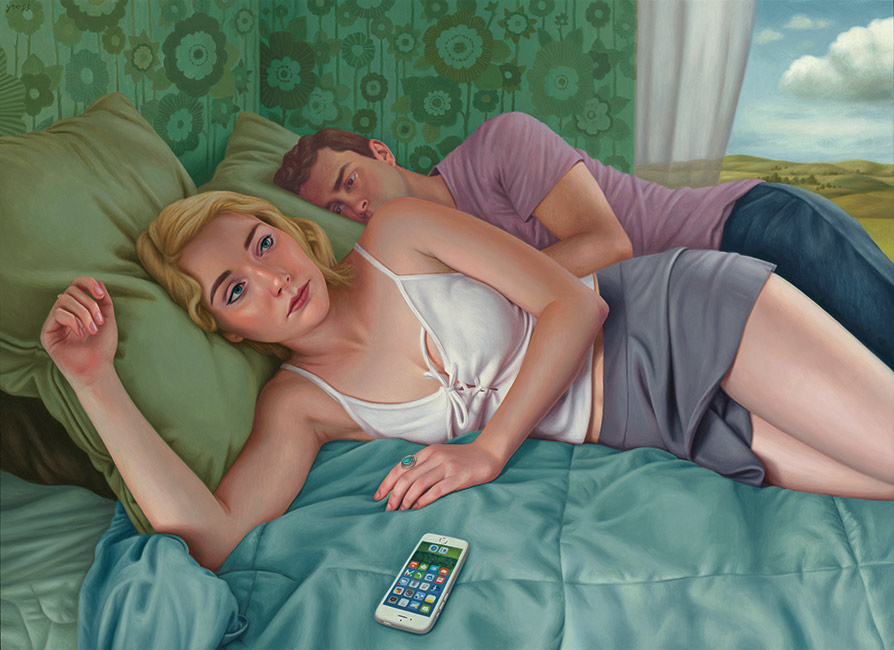
You have previously stated that comic books provided you with tremendous inspiration while growing up and that your passion for copying them provided you with your basic foundation in drawing. Do you still have an interest in sequential art and do you still implement any of those early lessons you learned from the comic masters? Or do you have some newer masters to turn to now, in order to keep progressing your skills and honing your practice?
I still love comic books, although I only read a few modern comics. But I continue to look at older comics on a regular basis. I don’t think it influences my work so much anymore, but I do think about possibly doing something in comics in the future. There are many great painters out there, if you want to talk about the idea of masters. But I don’t really look at very much painting now, believe it or not. Perhaps I am not developing my skills as much as I should be these days. But I stay busy making as much art as I can, and I do always try to push myself creatively and conceptually, if not technically.
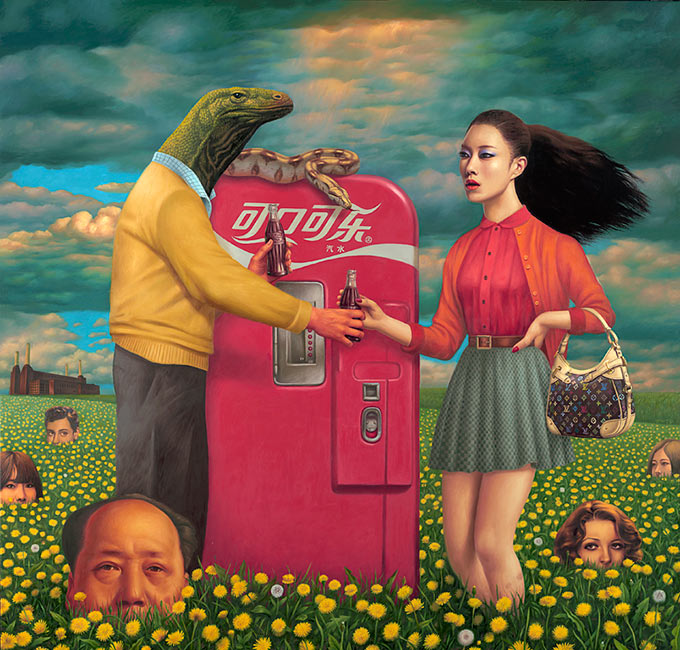
What do you feel is the most essential factor an artist must be open to, regarding the evolution of their practice? Having had a lengthy and successful career so far, how have you seen your own work evolve over time?
The most essential factor for most beginning artists is a willingness to be very poor. It’s a brutal existence. Even when you start selling work, there is no regularity to it. You might make a lot of money for a while, then there is a recession, or your work goes out of favor. Galleries are closing all over the place, and it’s much harder to sell work than it was five years ago. So, persistence and a low overhead are both really, really important.
My work has evolved conceptually, I think, in many ways, and intentionally. My early work was first influenced by Japan and the Victorian era. Eventually that became old for me, and I moved towards creating more contemporary imagery that speaks about the current world rather than the past. Where my work goes in the future, I don’t quite know. But I do always want to do work that makes people think.
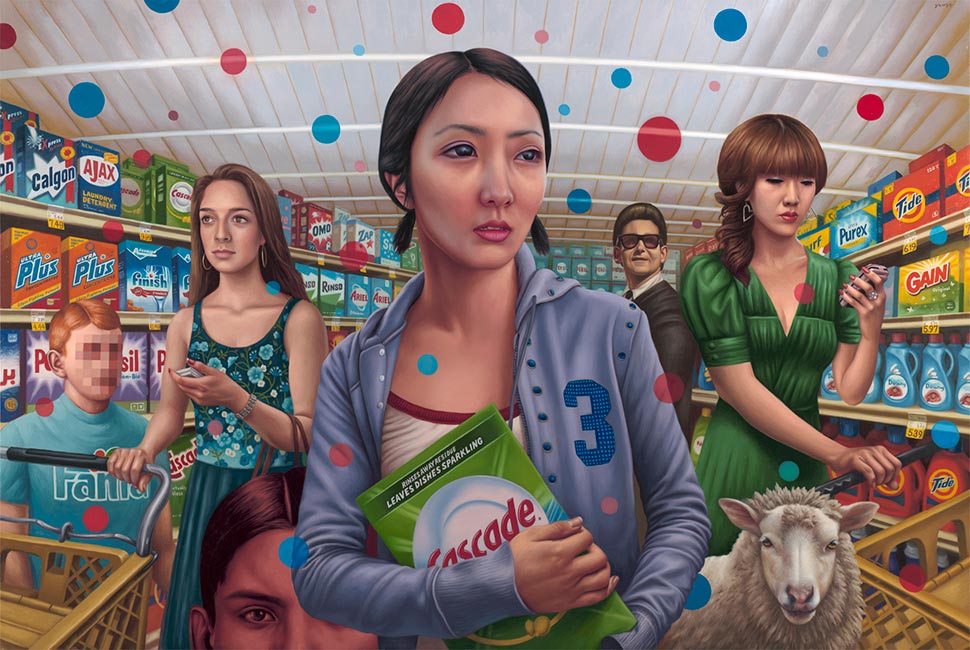
Why do you think that painting is still managing to stay relevant, irrespective of many critics and academicians proclaiming its death over the years?
Well, that’s a very debatable statement. I mean, how many painters today are famous, compared to musicians, actors, sports figures, or any other area of entertainment. I do think that representational art will always have some kind of audience, because it is accessible in at least a visual way, even if some people are not capable of getting into the conceptual part of a representational painting. Plus, there is the technique angle as well — many people can appreciate the skill of a beautifully handled painting.
But if you go to most of the major museums in America today, the idea that painting, and specifically representational painting, is still relevant, will not be something that you are thinking when you leave. You and I think it is relevant. But I wonder just how many other people really think so.
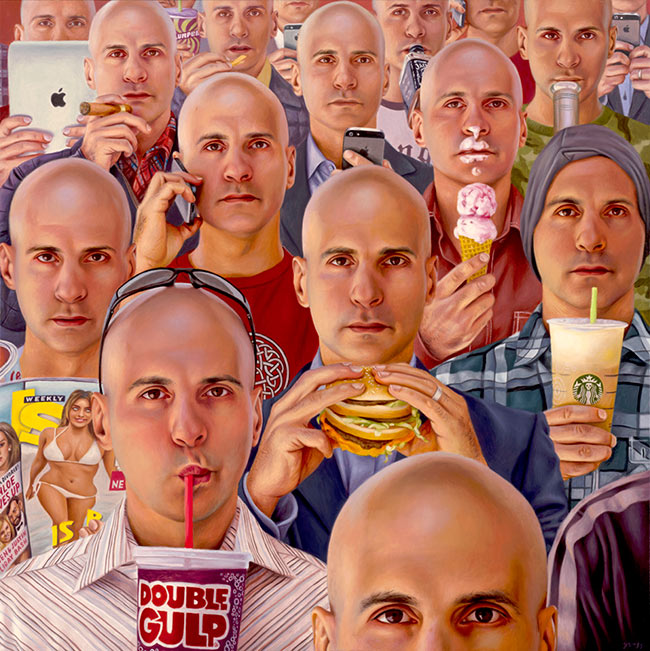
What’s the most unexpected feedback you received in your career?
I’ve had people tell me to my face that they liked my older work better. FYI, no one wants to be told that. I don’t think they meant to hurt my feelings either. I guess some people are so self-involved, that they cannot empathize with others.
What is your relationship with the history of art and do you feel that it is important to have a good understanding of what has come before? Can you talk about some of the artists from the past who have inspired you?
I have spent a great deal of time in my life looking at great painting from different periods of art history. I do feel that it is very important to know the history of any creative field that one pursues. It would be hard to imagine someone trying to become a filmmaker and never having seen anything by Welles, Kubrick, Coppola, or Scorsese. So, yes, young artists need to do some homework. But, now that I am no longer young, and I have found my path in this field, I find that I don’t look at too much painting from the past anymore. I do have two paintings in this exhibition that are heavily based on paintings by the great George Tooker, so I suppose that I do still sometimes look back. But for the most part, I do find that I work best when I am not too distracted by what other people are painting, or have painted before. I just try to do my thing and see where I can go with it. Tooker was amazing, I’d much rather live with a Tooker painting than a Pollock any day. I love Max Beckmann as well.
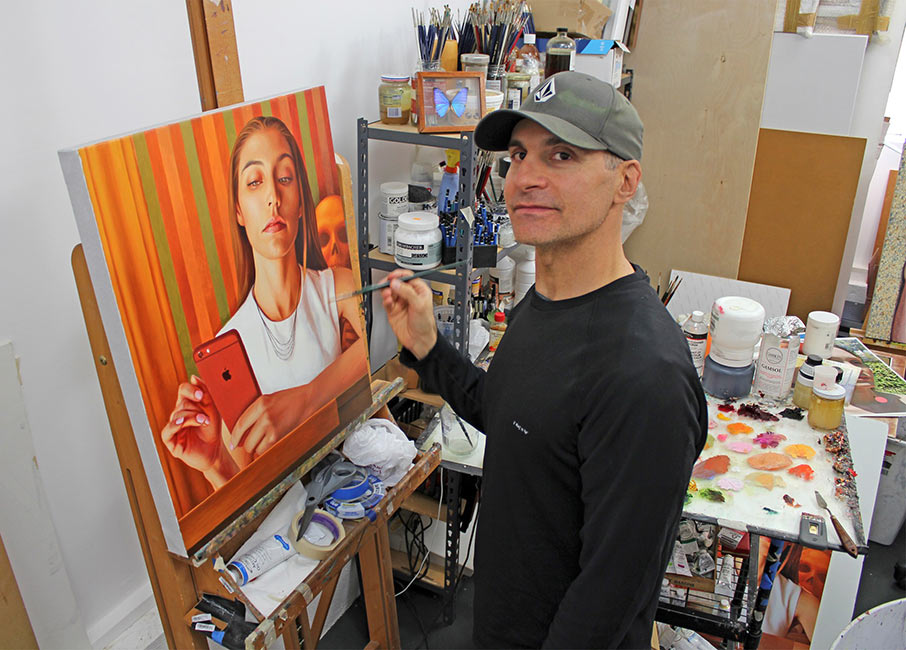
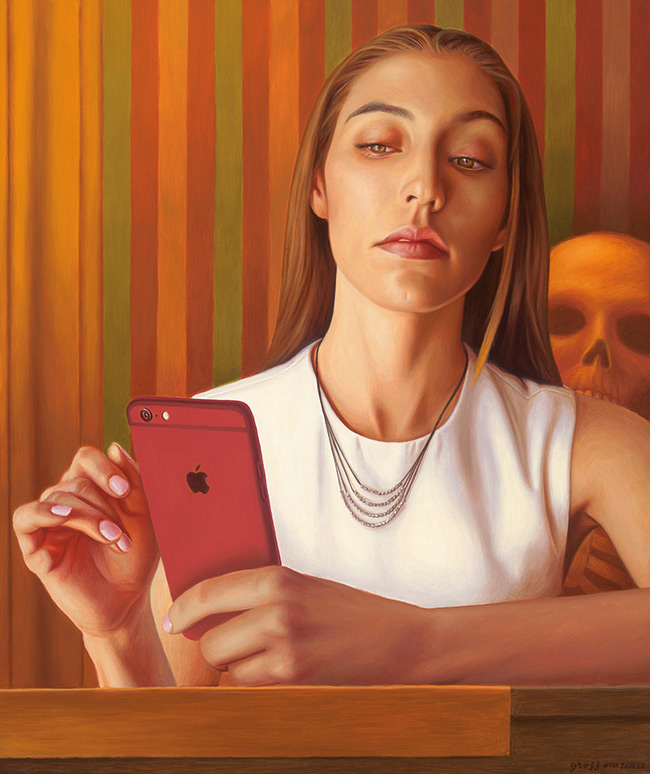
In order to get a better understanding of the personality of an artist, it can help to get a peek behind the curtain. Would you be willing to share a story from your own life, possibly one whose memory you find yourself returning to for inspiration, or maybe just a tale about a hardship you’ve overcome which has helped define the person and therefore artist that you are now?
I did an exhibition about eleven years ago, I think it was about my fourth exhibition. I had changed my style dramatically from what I had been doing before, and what made me somewhat known in this scene. The show did terribly from a sales perspective. Only a few things sold. It was the first time that I wasn’t able to sell a good amount of my work. It was deeply depressing. I was in a funk for a long time. Eventually, I just had to go back to the things I loved and which inspired me, and begin again to try and make work that felt good to me. Eventually, I made a piece that came out well and was well received. And I was able to start to build from there, eventually getting to a new place where I could be creative again. But it definitely hit home with me just how hard it is to do this for a living. Past success is no guarantee of future success and anything is possible. It’s something that I try not to forget.
What’s next for Alex Gross?
Hopefully a vacation.
